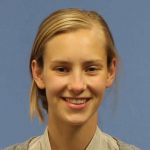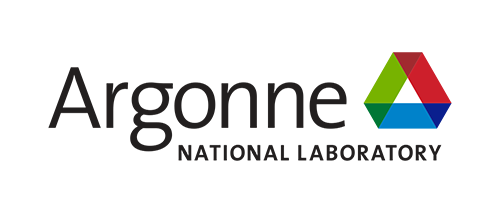September 2022 Edition

April Novak, Computational Scientist, CPS, and Maria Goeppert Mayer Fellow
There’s a small plaque at Argonne in Building 203 honoring Maria Goeppert Mayer for the 1963 Nobel prize in physics. Goeppert Mayer is one of only four women with that distinction, and she completed some of her research at Argonne, where a postdoctoral fellowship is named in her honor.
Today, April Novak is one of those fellows. For the past year and a half, the computational science postdoctoral researcher has worked and contributed at Argonne with a focus on nuclear fission reactors. Specifically, Novak’s efforts are directed toward the intersection of nuclear engineering and computational science.
Despite growing up within 30 minutes of Argonne, she had never heard of the lab or Goeppert Mayer before she studied nuclear engineering in college.
“When I began my undergrad program at the University of Illinois, I wasn’t sure which field of engineering to study. I enrolled in a seminar series that invited professors from every discipline of engineering to describe their work,” said Novak. “The professor from nuclear engineering was fascinating and charismatic, and I was immediately sold on the idea that we can create so much energy with tiny particles not visible to the human eye.”
Novak is the oldest in a family of three girls and she was always encouraged to pursue her interest in science. She is quick to cite both men and women who mentored her at various points of her undergraduate and graduate career. She said she has never felt alienated or like she didn’t belong within the scientific community.
Goeppert Mayer would be impressed.
The theoretical physicist emigrated from Germany with her physicist husband in the 1940s and was unable to find paid work in her profession for nearly 12 years. Undaunted, she persevered on a volunteer basis (read “unpaid”) until Sarah Lawrence University hired her as a professor. She was a working mother of two in an era when that was virtually unheard of.
As a member of a new and more progressive generation of female engineers, Novak is free to think about conquering other mountains. An avid hiker, she trekked 1,500 miles of the Pacific Crest Trail, from Los Angeles to Portland, with her husband during the pandemic. Next, she has her gaze set on the Continental Divide National Scenic Trail. She and her husband and a few leafy houseplants recently relocated to the state of Washington, where hiking trails are abundant.
Simultaneously, though, she dreams of leading a research group, making a positive impact within industry, and becoming known as the leading subject matter expert for computational science and nuclear engineering.
“Helping nuclear energy contribute to clean energy and climate change resolutions would be great validation for my career,” said Novak. “Nuclear energy has a lot to offer from a lot of perspectives and I believe I can contribute to making the world a better place.”


